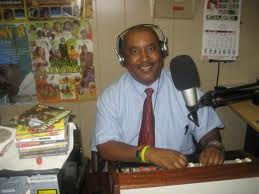BY CECELIA CAMPBELL-LIVINGSTON —–
RECENT research by American market company, NPD Group, discovered that Internet radio is the fastest growing medium for music fans in the United States.
With more reggae artists seeking alternative outlets for their music, the Jamaica Observer spoke with three operators of Internet reggae radio stations.
  Steve ‘Sir Rockwell’ Warner said he went into web radio because it is too expensive to buy time on traditional stations. Steve ‘Sir Rockwell’ Warner said he went into web radio because it is too expensive to buy time on traditional stations. |
South Florida disc jockey Steve ‘Sir Rockwell’ Warner hosts Da Real Rock Show on rockdabox.net. He says he went into web radio because it is too expensive to buy time on traditional stations. Da Real Rock enjoys over 12,000 hits per show.
According to Sir Rockwell, had he taken his show to a FM band in Florida he would have had to use a ‘brokered station’ and pay big bucks for air time.
“Caribbean radio has traditionally been brokered radio … with presenters having to pay for the air time. In South Florida, prime-time hours (7:00 am-7:00 pm) is averaging around US$400 per hour,” he explained.
While it can be costly to launch an Internet radio station, it is nothing compared to setting up a conventional radio station.
“Setting up properly for an Internet station can initially be expensive. There is the creation of a website, the purchase of a quality microphone along with a designated broadcast computer is a necessity,” Sir Rockwell said.
Other critical equipment such as CD players, would push the start-up cost up to around US$3,000.
At that point, the calculation is based on how many shows it would take to recover that US$3,000.
“So, somewhere after paying for seven shows, you could have your very own Internet station!” Sir Rockwell exclaimed.
Foundation Radio Network disc jockey Clinton Lindsay is also based in South Florida. He insists Internet radio is the next big thing in broadcasting.
“I can level the playing field in terms of playing artists that are no longer given airplay by these young disc jockeys,” said Lindsay. “I have learned that many radio executives are no longer interested in high quality programming, they are just following the hype,” he added. “The slogan here is ‘big people music with the young in mind’ which means in addition to the latest from foundation artists you will also hear from the talented young ones.”
Raymond ‘Shadow’ Small says he got the idea to start an Internet station after hearing a tourist looking for new music to take back home for her son. His Kingston-based 876 webradio streams a cross section of programmes with its main focus on entertainment, Caribbean culture and Jamaican current affairs. He says it attracts over 10,000 listeners on daily.
“I thought it would be a good idea to create an online outlet that could fill that void, so people could be updated with the latest happenings without ever setting foot on local soil,” said Small.
For Lindsay, having a home studio significantly cuts down on his monthly expenses.
“The last studio I had in a commercial building was running an average of $1,000 per month. Here, once I have a roof over my head and pay my cable and streaming bills, I am cool,” he said. “The rates on lease-time radio is going through the roof and lots of advertisers are cutting back.”
As far as Sir Rockwell is concerned web radio will soon be the premium choice for music listeners.
“I sit in my studio in Florida and reach listeners in Hawaii, Gambia, Israel, Germany and London. With Skype, I can receive calls from these listeners as well,” he said.
Another development is expected to further boost the fortunes of web radio. In a matter of months, most car owners will have access to Internet radio stations.
“This will undoubtedly level the playing field between terrestrial radio and Internet radio and it will boil down to content,” Sir Rockwell pointed out. Advertisers will have the option to spend their dollars on the ‘best’ station and no longer on the ‘only’ station that can reach listeners in their cars!”
As much as Lindsay is excited about the potential of Internet radio, he says FM radio is here to stay.
“If you recall, satellite radio was supposed to change the landscape of radio as we knew it, and it did not happen,” he stated. “However, being on the Internet gives me total freedom to programme the show the way I see fit, free from the pressure of broadcast radio.”



You must log in to post a comment.